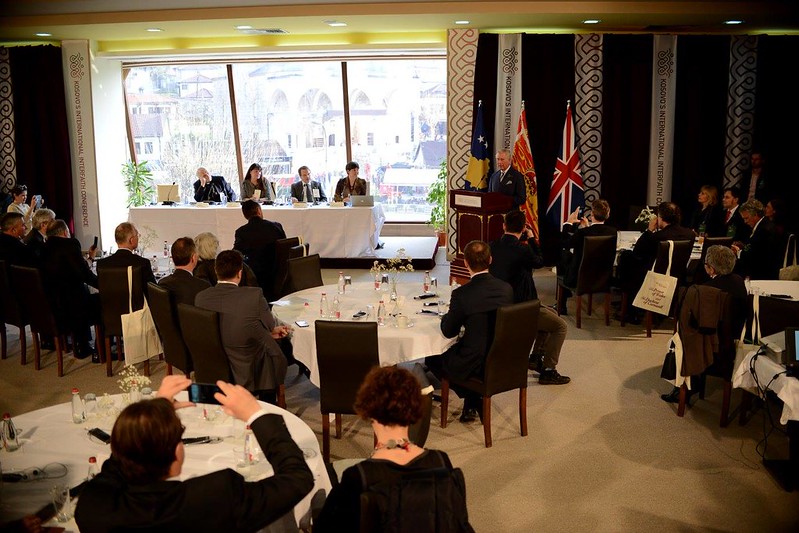HRH the Prince of Wales and Europa Nostra’s Secretary General promote heritage protection in Kosovo
On 18-19 March 2016, Europa Nostra’s Secretary General Sneška Quaedvlieg-Mihailović visited Kosovo and spoke at the International Interfaith Conference held in the historic city of Prizren, which was organised to coincide with the vist of HRH The Prince of Wales to the country as part of the Royal Tour of the Western Balkans. This conference focused on the importance of cultural heritage as a tool for economic and societal regeneration. Europa Nostra’s Secretary General was among the panelists in the session attended by The Prince.
At the opening of his address, HRH The Prince of Wales, who is the founder and patron of The Prince’s Regeneration Trust, expressed pride in receiving, on behalf of the Trust, the EU Prize for Cultural Heritage / Europa Nostra Award for the rehabilitation of Middleport Pottery in Stoke-on-Trent last January.

In his powerful speech, The Prince emphasised the importance of cultural heritage as a driver for economic development and intercultural dialogue. “I have spent a lot of my time trying to find ways of bringing back to life those things which are being destroyed or abandoned. I have discovered personally, through experience, that heritage-led regeneration is enormously effective. It can resuscitate economic activity. It can help to revive aspiration in areas where there is enormous deprivation and a lack of hope,” stated HRH The Prince of Wales. “It is only through reconciliation and forgiveness that a new beginning can be made. In order for countries which have been through such utter horror to recover, that has to be part of the building of the new foundation. I pray that those courageous people that cross the bridge to the other side win the day in the end,” The Prince added.
In her address, Europa Nostra’s Secretary General advocated: “Here in the Balkans, we indeed must continue restoring old bridges and building new ones, both physical bridges as well as the invisible ones which connect the hearts and minds of people and individuals. We must give equal attention to the proper interpretation of the historical and cultural significance of heritage sites. Far too often, here in the Balkans – like in many other post-conflict societies – heritage has become instrumentalised as a tool for perpetuating divisions rather than as a vital bridge between various ethnic and religious communities. Therefore, any future efforts by public and private bodies should make sure that the safeguard of heritage is accompanied by proper understanding and teaching of history: local, regional and European which are so firmly interwoven.”
The other panelists of this session were Reverend Donald Reeves, an Anglican priest who has been working in the Balkans since 2000 and who was one of the instigators of the reconstruction of the Ferhadija Mosque in Banja Luka, and architect Tina Wik, who has extensive experience in post-disaster architectural conservation in Bosnia and Herzegovina as project leader for CHwB – Cultural Heritage without Borders (winner of an EU Prize for Cultural Heritage / Europa Nostra Award in 2014 in the category Education, Training and Awareness-Raising). The discussion was moderated by Ambassador Dr. Dimitris Moschopouls from Greece.
After the conference, which was opened by Kosovo’s Acting Foreign Minister Petrit Selimi, Sneška Quaedvlieg-Mihailović met with representatives from European Institutions (EU, Council of Europe and OSCE) and Ambassadors from various EU Member States and discussed a possible event to be organised by Europa Nostra in Kosovo which would bring together public and private stakeholders concerned with the protection of cultural heritage.
Prior to the conference, Europa Nostra’s Secretary General visited the Dečani Monastery in Dečani, one of the four Serbian Orthodox medieval monasteries in Kosovo, which is on UNESCO’s List of World Heritage in Danger. Sneška Quaedvlieg-Mihailović had a fruitful meeting with Father Sava Janjic, Abbot of the Monastery, who informed her of the challenges and ongoing threats to the safeguarding of this exceptional site and expressed the wish to cooperating with Europa Nostra in the future.
“The Visoki Dečani Monastery is on the List of World Heritage in Danger together with three other Serbian Orthodox churches which belong to the UNESCO ensemble of the Medieval Monuments in Kosovo. These sites are not museums but living religious communities that have survived centuries of turbulent history in the Balkans. This beautiful medieval monastery is strongly protected by NATO peacekeepers because it has suffered four armed attacks by Kosovo Albanian extremists in the last 16 years. These attacks did not happen during but after the armed conflict in Kosovo despite an international peace-mission which calls for more attention to these monuments by European institutions. I am fully assured that Europa Nostra will help us bring more attention to Dečani Monastery and other endangered heritage sites in Kosovo because they are symbols of European culture and civilisation and as such, are essentially important for all Europeans regardless of their ethnicity or religion”, affirmed Father Sava Janjic






